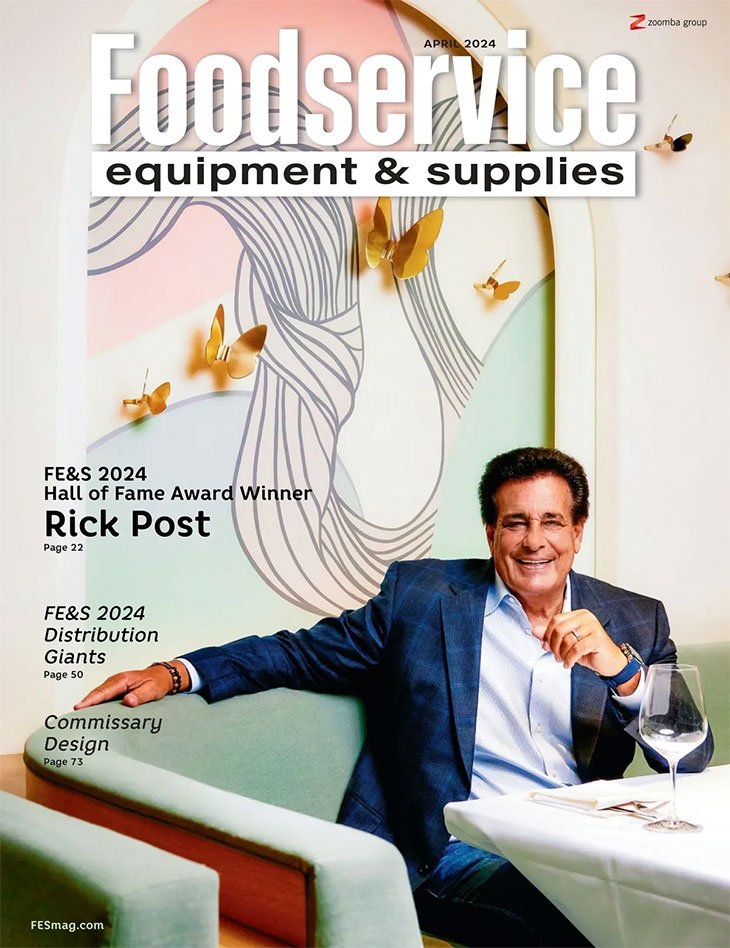It's not uncommon to see more consultants linking up these days, be it a casual partnership between a management advisory services (MAS) specialist and kitchen designer or full-blown merger combining both. Whereas in years past consultants — and all of us in the industry — may have kept more to ourselves, times are changing; many see forming partnerships as an opportunity to expand their services, segments, and reach.
"As a society we seem to be moving toward a sharing of ideas and information," says Doug Huber, CFA, CFSP, FCSI, principal of Foodservice Consultants Studio in Ashland, Va., which recently formed an alliance with John Cornyn and Joyce Fasano of The Cornyn Fasano Group in Portland, Ore. "If you think about social media, and Google now trying to map the world based on what people are sending them, there is a real free exchange of information these days. It seems like maybe there is a lot more openness and receptivity to working more together."
This sharing-is-growth mentality has touched all industries, including foodservice. But for any partnership to begin, two companies or people of like-minded goals and philosophies need to join as one. "It's kind of like dating," points out Jim Webb, CFSP, founding principal of DM&A Webb Food Service Design & Consulting in Tustin, Calif., which last year partnered with DM&A (formerly Don Miller & Associates) out of San Diego.
"We tried working with other consultants, but we didn't mix well — one or both of the parties were resistant to change or giving up some control or information. Don Miller and I knew that we had similar interests, goals and philosophies. We both fulfill a piece of the pie: We fulfilled the design aspect of projects and he fulfilled the business consulting side. Together we bring strategic planning to all our projects."
Expanding Services
When dating works out, it can often lead to marriage. In the consultant world, these partnerships can mean a marriage between a MAS/business consultant and a designer, just as in Webb and Huber's case.
"Just as in dating, there are a lot of elements that have to be in place for it to work out, and the same goes for consultants," Huber says. "Partners can't be joined with someone else, they have to have compatibility, and the timing has to be right. You have to have the same mode of operation, basically."
In the case of Foodservice Consultants Studio and The Cornyn Fasano Group, the idea of a partnership had been brewing for some time in Huber's mind. But it was only until a serendipitous airport pickup in Seattle for an FCSI conference that Huber finally found some quiet time with Cornyn and Fasano, with whom he had developed a friendship over the years through the foodservice consultant-based professional society, to be able to share his thoughts. "We share a commonality through our work ethic and by strongly adhering to the FCSI Code of Ethics, but it's more than that," Huber says. "We have a deep desire to maintain our corporate integrity, and we share the same philosophies."
Though Huber has an operations background and Foodservice Consultants Studio does offer some MAS services, the Virginia-based firm primarily focuses on design. The partnership with the MAS-focused Cornyn and Fasano Group meant that both could expand their services and their business by landing more projects. "There's a very obscure line between MAS and design and oftentimes one informs the other," Huber says. "When you're an MAS designer, having design and equipment knowledge comes in handy, so John and Joyce can turn to me and ask for input." These days, that line between MAS and design is becoming blurred, Huber says, adding that "it's great to specialize, but having crossover skills and capabilities is really important."
For Webb, there was a reason why DM&A became DM&A Webb specifically. "We wanted to really create strength in our company and present ourselves in the industry as a real force under one roof, rather than just a strategic alliance," Webb says. He also points out that "roof" is more a figurative term, as both companies continue to work out of their original hubs in San Diego and Tustin, Calif. "Our goal is to be the largest and best, or most-qualified, foodservice consulting company in the country and present ourselves as a full-service firm, with everything from strategic planning services to culinary consulting through our eight certified executive chefs."
Expanding Reach
The partnership between DM&A and Webb caused them to expand in number by adding 30 more people to get to 50 and geographically, as both groups have satellite offices around the country. But, most importantly, Webb notes, aligning with DM&A helped his team expand into the healthcare segment, a newer realm for the group, which primarily focuses on the college/university, K-12 and B&I segments.
The strategic partnership helped grow the consultancy's chain work as well. "Now when we work with restaurant chains, some of them are ready to change 70 stores without research-based knowledge," Webb says. "Before getting into their design, we bring our strategic planning studio to analyze their concept first. People are much more aware of the total business picture now — it's not like a client can say, "well we feel like being a 50's diner today." It's more about what does the public want, and how best we can serve them."
In Huber's case, one firm will call the other to work together on projects and occasionally they'll interview on a project together. "There is an importance in understanding operations to do any design," Huber says. "I have many examples where a certain design already in place wouldn't work for the operator and allow them to do what they do."
Eric Norman, FCSI, vice president of MVP Services Group, says he has worked with other consultants on K-12 school projects in some cases because the school made a request to have both an MAS and design consultant on board. While MVP Services Group does offer MAS as well as design services, partnering specifically with a business consultant — and being able to bring in the right one based on their existing relationships — helped both teams better help the customer, Norman says.
"We're unique in that we do both MAS and design, but for firms that do one or the other there is a much larger opportunity for regular partnerships because they can work off each other," Norman says. "The MAS consultant can do the upfront planning and then the designer can come in and develop the design based on the assessment beforehand. I see a huge benefit to all projects with that, and I see that happening more and more."
Having the opportunity to work with other consultants can not only grow your project load but can also offer expanded opportunities for continued learning and development. "That's where the value of FCSI and all the networking over the years really comes into play," he says. "If we need assistance we know how to look for other firms that are strong in a particular area, and then we can both learn from each other." This was certainly the case when MVP Services Group brought in another consultant for laundry design, an area in which they had less experience.
Setting Up the Partnership
Though Huber has a background in restaurant mergers and acquisitions, the partnership with The Cornyn Fasano Group right now is more of a trust-based, referral setup than a legal or contractual merger. "There are varying degrees of collaboration," he says. "Even though we have enough trust in each other just to work with each other, I would recommend to others looking to form partnerships that they find a way to frame up legally how they're going to work together."
That could mean signing collaboration agreements or more formal contracts and subcontracts, or even going the official merger route. "You really need to understand your business and figure out what works for you," Huber says. "Definitely do your due diligence on what it takes to integrate firms." In his case, that meant a couple ride-alongs with Cornyn to understand what his firm did, even before the more formal partnership began.
While DM&A Webb didn't go through an official merger, they did merge their brand names and supporting logos, websites and other marketing to clearly show the partnership. "Organizationally we're set up as two separate divisions or studios within the same company," Webb says. When it comes to which type of partnership to form, he notes, "A lot of consultants are afraid to share intellectual property so it depends on the situation. You have to have a lot of trust because things move more quickly."
For MVP Services Group, in a large project situation with multiple consultants, "You agree as part of the contract documents how you will split the work," Norman says. "In our case, we sat down and talked to the MAS consultant about what we both brought to the table, and determined who was strong in what."
Creating an Exit Strategy
Some consultant partnerships are born partially out of a need to create an exit strategy in preparation for a retirement, even if that could be years away.
This thinking came into play with the Cornyn Fasano Group and Foodservice Consultants Studio — on both sides of the table.
For Webb, the exit strategy is more about "creating sustainability within our company," he says. Through the DM&A partnership, "we are able to attract more qualified consultants for our team, and really create an organization that has growth and mobility."
And, when you get right down to it, the opportunity for growth and mobility is what most foodservice consulting firms seek. So for a growing number, partnerships will pave the path to this promise.




